Gauguin, Paul (1848-1903)
Arlésiennes (Mistral)
1888
Oil on jute canvas, 73 × 92 cm
Art Institute of Chicago, Chicago
One of seventeen canvases that Paul Gauguin completed during a brief and tumultuous visit with Vincent van Gogh in Arles, this powerful and enigmatic painting depicts the public garden directly across from Van Gogh’s residence, the “Yellow House.” Not only is the careful planning of the composition in marked contrast to the spontaneity seen in Van Gogh’s depiction of the same scene (State Hermitage Museum, Saint Petersburg), but everything about the painting—its large, flat areas of color; arbitrary handling of space; and enigmatic silhouettes—also exemplifies the deliberateness with which Gauguin sought pictorial harmony and symbolic content in his work. Here four women wrapped in shawls slowly stroll through the garden. The two closest to the viewer avert their gazes and curiously cover their mouths. Their somber outlines echo the two orange cones, which probably represent shrubs wrapped against the frost. The bench along the upper-left path rises steeply, defying logical perspective. Equally puzzling is the mysterious bush on the left, in which Gauguin consciously embedded forms that suggest eyes and a nose, creating the impression of a strange, watchful presence. With its aura of repressed emotion and elusive meaning, Arlésiennes (Mistral) explores the ambiguities, mysteries, and emotions that Gauguin believed underlie appearances. (AIC)
